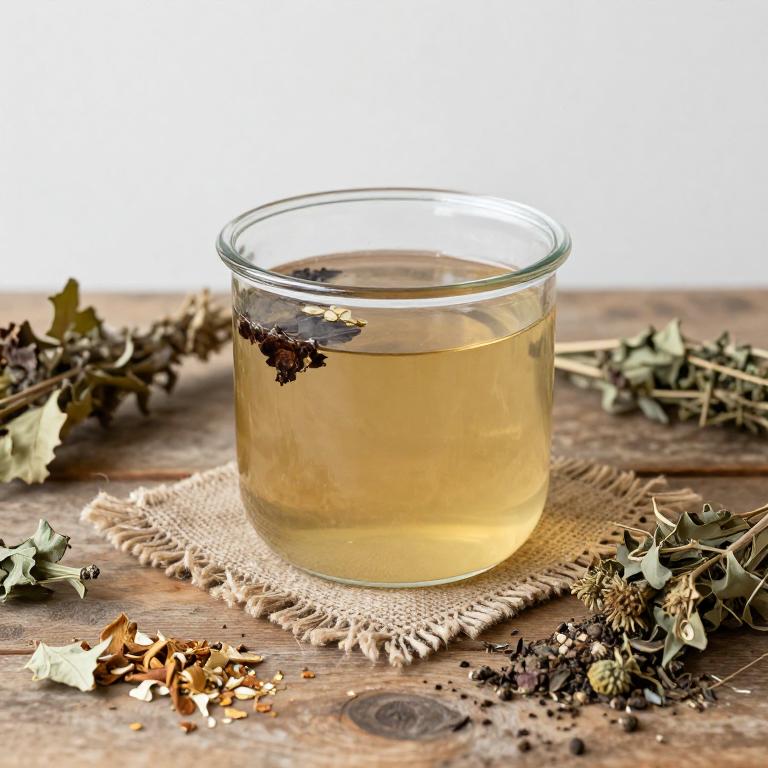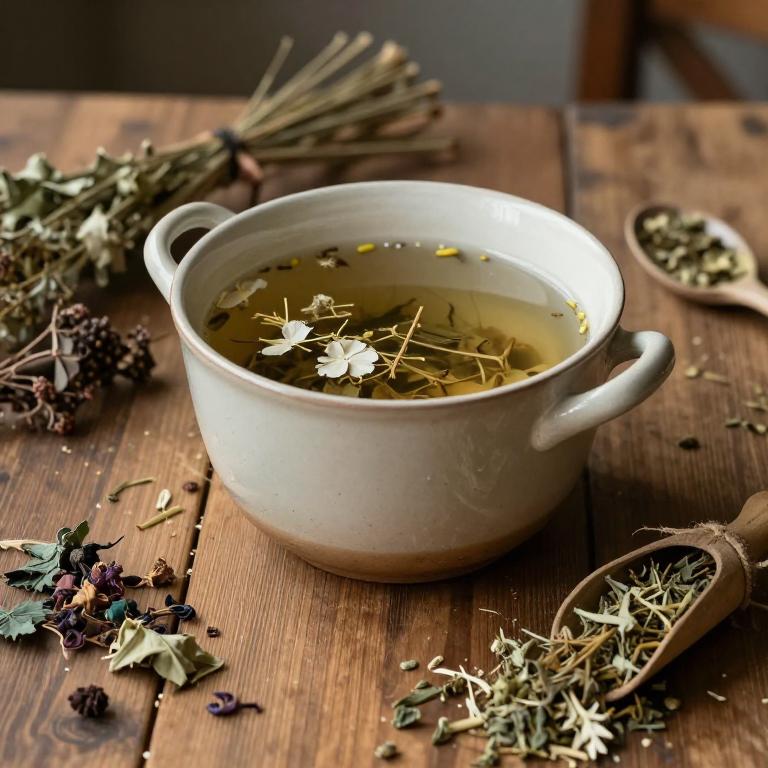10 Best Herbal Decoctions For Mucus In Stomach

Herbal decoctions have been traditionally used to alleviate symptoms of excess mucus in the stomach, often associated with conditions like gastritis or peptic ulcers.
These decoctions typically include herbs such as licorice root, ginger, and turmeric, which possess anti-inflammatory and mucosal protective properties. By simmering these herbs in water, the resulting infusion can help soothe the stomach lining and reduce mucus production. The gentle nature of herbal decoctions makes them a preferred option for many seeking natural remedies.
However, it is advisable to consult a healthcare professional before using these remedies, especially for prolonged periods or in combination with other medications.
Table of Contents
- 1. Ginger (Zingiber officinale)
- 2. Turmeric (Curcuma longa)
- 3. Fennel (Foeniculum vulgare)
- 4. Black pepper (Piper nigrum)
- 5. Cumin (Cuminum cyminum)
- 6. Thistle (Silybum marianum)
- 7. Licorice (Glycyrrhiza glabra)
- 8. Peppermint (Mentha piperita)
- 9. Stinging nettle (Urtica dioica)
- 10. Marshmallow (Althaea officinalis)
1. Ginger (Zingiber officinale)

Zingiber officinale, commonly known as ginger, has been traditionally used in herbal medicine for its ability to alleviate digestive discomfort and reduce mucus production in the stomach.
Ginger contains bioactive compounds such as gingerols and shogaols, which possess anti-inflammatory and mucolytic properties that help break down excess mucus. Herbal decoctions made from fresh or dried ginger root can be prepared by simmering the root in water for several minutes, allowing the active compounds to dissolve into the liquid. These decoctions are often consumed before meals to aid digestion and prevent the buildup of stomach mucus.
While generally safe, individuals with gastrointestinal ulcers or bleeding disorders should consult a healthcare provider before using ginger-based remedies.
2. Turmeric (Curcuma longa)

Curcuma longa, commonly known as turmeric, has been traditionally used in herbal medicine for its anti-inflammatory and digestive properties.
Its active compound, curcumin, is believed to help reduce mucus production in the stomach by inhibiting the activity of inflammatory pathways. Herbal decoctions made from turmeric root can be prepared by boiling the dried rhizome in water, allowing the beneficial compounds to be extracted. These decoctions are often used to alleviate symptoms such as indigestion, bloating, and excessive gastric mucus.
However, it is important to consult a healthcare professional before using turmeric decoctions, especially for individuals with existing gastrointestinal conditions or those taking medications.
3. Fennel (Foeniculum vulgare)

Foeniculum vulgare, commonly known as fennel, has been traditionally used in herbal medicine for its potential to alleviate mucus-related issues in the stomach.
The decoction of fennel seeds is often prepared by simmering the dried seeds in water, allowing the active compounds to be extracted for consumption. This herbal remedy is believed to help reduce excess mucus production and soothe gastrointestinal irritation due to its antispasmodic and carminative properties. Fennel contains compounds like anethole and essential oils that may support digestion and protect the stomach lining.
However, it is advisable to consult a healthcare professional before using fennel decoctions, especially for individuals with existing digestive conditions or those taking medications.
4. Black pepper (Piper nigrum)

Piper nigrum, commonly known as black pepper, has been traditionally used in herbal medicine for its potential therapeutic effects on digestive health.
When prepared as a herbal decoction, black pepper may help reduce excess mucus in the stomach by stimulating the production of digestive enzymes and improving gastric motility. The active compound, piperine, is believed to contribute to its anti-inflammatory and mucolytic properties, which can aid in breaking down mucus buildup. However, while some studies suggest its benefits, more clinical research is needed to fully understand its efficacy and safety for this specific use.
As with any herbal remedy, it is advisable to consult a healthcare professional before using piper nigrum decoctions, especially for individuals with pre-existing gastrointestinal conditions.
5. Cumin (Cuminum cyminum)

Cuminum cyminum, commonly known as cumin, has been traditionally used in herbal medicine for its potential digestive benefits, including the reduction of mucus in the stomach.
When prepared as a herbal decoction, cumin seeds are boiled in water to extract their active compounds, such as essential oils and alkaloids, which may help soothe the gastrointestinal tract. This decoction is believed to promote digestion, reduce bloating, and alleviate excess mucus production in the stomach lining. Its warming properties are thought to improve gastric motility and reduce inflammation.
However, while some anecdotal evidence supports its use, more scientific research is needed to fully confirm its efficacy for this specific application.
6. Thistle (Silybum marianum)

Silybum marianum, also known as milk thistle, has been traditionally used for its potential health benefits, including its effects on gastrointestinal health.
Herbal decoctions made from the seeds of Silybum marianum are often prepared by boiling the dried seeds in water to extract their active compounds, such as silymarin. These decoctions are believed to support the digestive system by reducing inflammation and protecting the stomach lining from irritants. Some studies suggest that silymarin may help regulate mucus production in the stomach, potentially alleviating symptoms of gastritis or ulcers.
However, more clinical research is needed to fully understand its efficacy and safety when used as a herbal remedy for stomach mucus issues.
7. Licorice (Glycyrrhiza glabra)

Glycyrrhiza glabra, commonly known as licorice root, has been traditionally used in herbal medicine for its potential benefits in reducing mucus production in the stomach.
The active compounds in licorice root, such as glycyrrhizin and flavonoids, are believed to exert anti-inflammatory and mucoprotective effects, which may help soothe irritated stomach lining and reduce excessive mucus secretion. When prepared as a decoction, licorice root is typically simmered in water to extract its therapeutic compounds, making it a popular remedy for digestive discomfort. However, prolonged use of licorice root decoctions may lead to side effects such as hypertension due to its mineralocorticoid-like effects, so it should be used with caution and under professional guidance.
Despite its traditional use, further clinical research is needed to fully establish its efficacy and safety for treating mucus-related stomach issues.
8. Peppermint (Mentha piperita)

Mentha piperita, commonly known as peppermint, has been traditionally used in herbal medicine for its soothing properties, particularly in addressing digestive issues.
Peppermint herbal decoctions are often prepared by steeping dried leaves in hot water, creating a calming beverage that can help alleviate discomfort in the stomach. The active compounds in peppermint, such as menthol and methyl salicylate, have antispasmodic effects that can reduce muscle contractions in the gastrointestinal tract. These decoctions are believed to help ease symptoms like bloating, gas, and excess mucus production in the stomach.
However, while peppermint may provide relief for some individuals, it is important to consult a healthcare professional before using it, especially for those with certain medical conditions or who are taking medications.
9. Stinging nettle (Urtica dioica)

Urtica dioica, commonly known as stinging nettle, has been traditionally used in herbal medicine for its potential digestive benefits.
A decoction of Urtica dioica can be prepared by simmering the dried leaves and roots in water for several minutes, allowing the active compounds to be extracted. This herbal preparation is believed to help reduce excess mucus in the stomach by promoting healthy digestion and reducing inflammation in the gastrointestinal tract. The plant contains various bioactive compounds, including flavonoids and minerals, which may contribute to its soothing effects on the stomach lining.
However, it is important to consult a healthcare professional before using Urtica dioica, as it may interact with certain medications or conditions.
10. Marshmallow (Althaea officinalis)

Althaea officinalis, commonly known as marshmallow, has been traditionally used in herbal medicine for its soothing properties, particularly in the form of decoctions.
When prepared as a herbal decoction, the roots and leaves of Althaea officinalis are simmered in water to extract their mucilage-rich compounds, which have a demulcent effect. This demulcent action helps to coat and protect the lining of the stomach, reducing irritation and promoting the healing of mucous membranes. The mucilage in marshmallow decoctions can also help to regulate mucus production, making it beneficial for conditions involving excess or insufficient mucus in the digestive tract.
As a result, Althaea officinalis decoctions are often used to alleviate symptoms such as indigestion, gastritis, and other gastrointestinal discomforts associated with mucus imbalances.